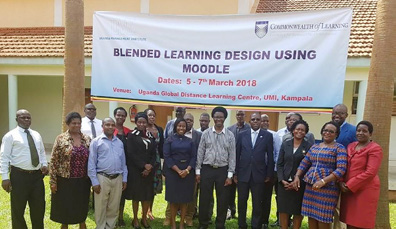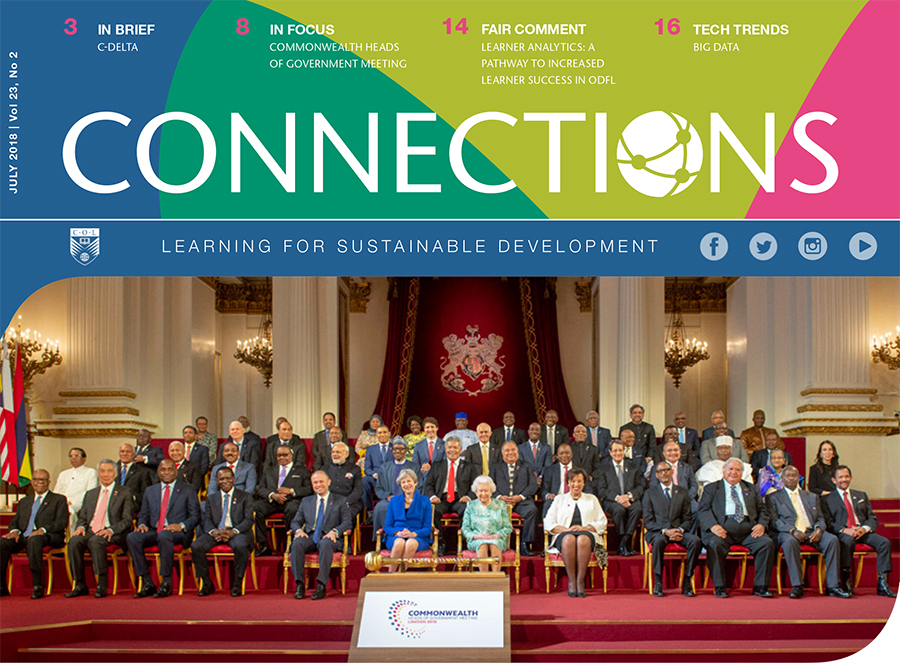
CHOGM 2018 Family Photo (Credit: Commonwealth Secretariat).
Download the digital version (PDF) from OAsis
Sign up to receive email updates from COL.
COVER STORY
CHOGM 2018
Heads of government commit to gender equality and inclusion
The theme of CHOGM 2018 was ‘Towards a Common Future.’
Heads of Commonwealth countries gathered in London for the 2018 Commonwealth Heads of Government Meeting (CHOGM), from 16 to 20 April 2018. The theme of CHOGM 2018 was “Towards a Common Future.” A major highlight of the event was the decision of heads that The Prince of Wales succeeds The Queen, in due course, as Head of the Commonwealth.
In their Communique, the heads of government thanked the Commonwealth of Learning (COL) and other organisations in the Commonwealth family and encouraged their continued contribution to Commonwealth objectives. They noted the ongoing action by Member States and Commonwealth institutions to prevent and eliminate child, early and forced marriage as one of the barriers to the advancement and full utilisation of girls’ and women’s human rights to sustainable growth and development. They committed to promoting gender equality and inclusion, as well as the empowerment of all women and girls in social, economic and political life.
Guided by the principle of leaving no one behind, the leaders agreed to support and provide quality education for marginalised groups, especially disadvantaged girls, through appropriate policies, advocacy and strategic partnerships. They highlighted the role of technology and innovation in promoting inclusion and sustainable development and in bridging the digital divide.
Heads adopted a Commonwealth Cyber Declaration to enhance cybersecurity to protect critical national infrastructure, and the economic and social value of cyberspace. They expressed concern about the increasingly devastating impact of climate change and natural disasters on people and property across the Commonwealth and committed to working together to resolve these challenges.
COL’s delegation, led by the Board Chair, Dr Linda Sissons, CNZM, participated in several CHOGM forums, including the People’s Forum and Women’s Forum. COL’s President and CEO, Professor Asha Kanwar, made two presentations to the foreign ministers, highlighting COL’s service to the Commonwealth in the past 30 years.
Presentations | CHOGM 2018 Communique
REGIONAL NEWS
PAN-COMMONWEALTH
New platform for digital education skills
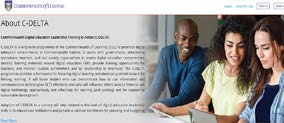 Recognising the need for digital education skills for lifelong learning and access to quality education for all, COL launched the online platform Commonwealth Digital Education Leadership Training in Action (C-DELTA) in May 2018. It is an open-access platform for both teachers and students to improve their skills through practice in their own time, place and pace.
Recognising the need for digital education skills for lifelong learning and access to quality education for all, COL launched the online platform Commonwealth Digital Education Leadership Training in Action (C-DELTA) in May 2018. It is an open-access platform for both teachers and students to improve their skills through practice in their own time, place and pace.
Disruptive technology changing educational landscape
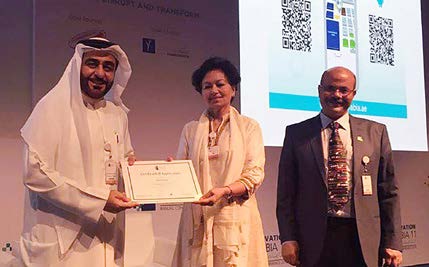 COL President and CEO, Professor Asha Kanwar, stressed in her keynote address at Innovation Arabia 11, in Dubai, United Arab Emirates, that while technological disruption is changing the educational landscape for the better, higher education systems must ensure equitable opportunity for all to prevent the further widening of the digital divide. She noted the need to have appropriate policies in place to provide affordable and low-cost options to people with disabilities and other learners in need of higher education.
COL President and CEO, Professor Asha Kanwar, stressed in her keynote address at Innovation Arabia 11, in Dubai, United Arab Emirates, that while technological disruption is changing the educational landscape for the better, higher education systems must ensure equitable opportunity for all to prevent the further widening of the digital divide. She noted the need to have appropriate policies in place to provide affordable and low-cost options to people with disabilities and other learners in need of higher education.
“We need to prepare an ecosystem that promotes lifelong learning for all,” said Professor Kanwar. Simply reforming current education systems will not be enough in the face of technological advancement – countries will need to continually skill and reskill their workforces. She pointed to recent technological developments in education, especially the mainstreaming of open and distance learning in higher education to cater to more learners, including the unreached. She also highlighted the role of messaging apps, massive open online courses and open educational resources in expanding access to education and training.
Women leaders in ODL
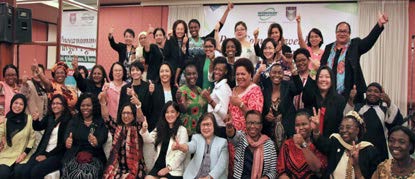 COL and the Wawasan Open University (WOU) organised the Pan Commonwealth Training Programme on Women and Leadership in open and distance learning (ODL) in Penang, Malaysia in June 2018. The training was aimed at building a network of role models and mentors to provide ongoing guidance and support the needs of women leaders in ODL to realise their full potential. Thirty-five participants from more than 20 Commonwealth countries attended the three day event. The sessions encouraged the participants to evolve a strategy to strengthen women s leadership in ODL in order to address Sustainable Development Goals 4 and 5. A vibrant Facebook community of practice (CoP) called Women 4.5 was established by participants as a social learning and professional networking hub. Through this platform, participants are sharing plans and resources for follow up projects in their respective countries. The CoP is available at: https://www.facebook.com/groups/pcommwomen/
COL and the Wawasan Open University (WOU) organised the Pan Commonwealth Training Programme on Women and Leadership in open and distance learning (ODL) in Penang, Malaysia in June 2018. The training was aimed at building a network of role models and mentors to provide ongoing guidance and support the needs of women leaders in ODL to realise their full potential. Thirty-five participants from more than 20 Commonwealth countries attended the three day event. The sessions encouraged the participants to evolve a strategy to strengthen women s leadership in ODL in order to address Sustainable Development Goals 4 and 5. A vibrant Facebook community of practice (CoP) called Women 4.5 was established by participants as a social learning and professional networking hub. Through this platform, participants are sharing plans and resources for follow up projects in their respective countries. The CoP is available at: https://www.facebook.com/groups/pcommwomen/
High-level leadership summit for vice chancellors
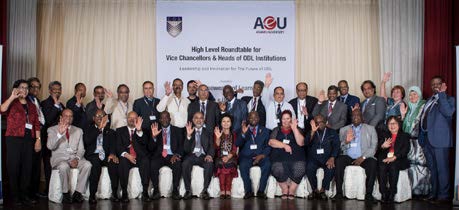 Leaders who will shape the future of open and distance learning (ODL) must invest in the philosophy of “openness,” people and processes. This was the core message in Professor Asha Kanwar’s keynote address titled “Leadership and Innovation for the Future of ODL,” at the 2nd High-Level Roundtable for Vice Chancellors and Heads of ODL Institutions, held in Kuala Lumpur, Malaysia in May 2018.
Leaders who will shape the future of open and distance learning (ODL) must invest in the philosophy of “openness,” people and processes. This was the core message in Professor Asha Kanwar’s keynote address titled “Leadership and Innovation for the Future of ODL,” at the 2nd High-Level Roundtable for Vice Chancellors and Heads of ODL Institutions, held in Kuala Lumpur, Malaysia in May 2018.
Professor Kanwar noted that leaders must create an institutional culture where innovative thinking flourishes: “The founding philosophies of ODL institutions should inspire future leaders of such institutions, who must not only motivate and inspire staff but also provide incentives where appropriate,” she said. “Leaders must also develop the policies and processes that foster innovation. There must be an environment for healthy discussion and debate and a targeted approach to addressing specific issues.”
She observed that with the advancement of technology, ODL has evolved to cater to those who were left outside mainstream higher education. For ODL institutions to stay relevant, leaders must continue to engage with governments, build relationships with other institutions and cultivate communities of students and alumni. The High-Level Roundtable was organised by COL in collaboration with Asia e University, Malaysia. It was attended by 31 vice chancellors and heads of ODL institutions from 19 countries.
Global trends in OER
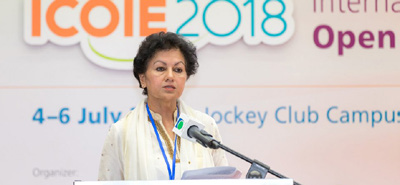 In her keynote address at the International Conference on Open and Innovative Education, in Hong Kong in July 2018, Professor Asha Kanwar highlighted some global trends and future directions in open educational resources (OER), suggesting that to move towards the future of effective learning, learners must become producers rather than consumers of OER.
In her keynote address at the International Conference on Open and Innovative Education, in Hong Kong in July 2018, Professor Asha Kanwar highlighted some global trends and future directions in open educational resources (OER), suggesting that to move towards the future of effective learning, learners must become producers rather than consumers of OER.
One of the global trends shows that OER repositories are increasingly available in diverse fields. For example, to address the issue of language and cultural barriers in mainstreaming OER, COL launched L3Fpedia – the world’s first Tamil-language OER repository, created by farmers for farmers in Tamil Nadu, India.
While addressing some of the challenges of mainstreaming OER, Professor Kanwar noted the need for OER to open up education from its narrow academic confines to a broader perspective of lifelong learning. She posed the following questions: “Can OER contribute to creating a lifelong learning environment to support the changing learning needs of the 21st century? What will be the role of technologies in the future of teaching and learning?”
3 Es for learning in the Digital Age
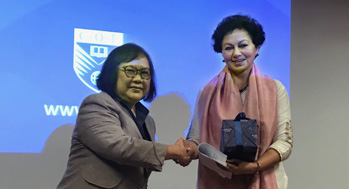 COL’s President and CEO, Professor Asha Kanwar, stressed that three Es – equity, empathy and ethics – are necessary to reimagine learning in an age of uncertainty induced by developments such as artificial intelligence. In a public lecture organised by Wawasan Open University, Malaysia, she noted that preparing millennials to be employable would require a balance between theory and practice, as well as a focus on hard and soft skills.
COL’s President and CEO, Professor Asha Kanwar, stressed that three Es – equity, empathy and ethics – are necessary to reimagine learning in an age of uncertainty induced by developments such as artificial intelligence. In a public lecture organised by Wawasan Open University, Malaysia, she noted that preparing millennials to be employable would require a balance between theory and practice, as well as a focus on hard and soft skills.
To create an education system that is responsive to market needs and future requirements, Professor Kanwar suggested that stakeholders examine the different stages of the employability pathway, including policies and practices.
Smart OER will foster sustainable education for all
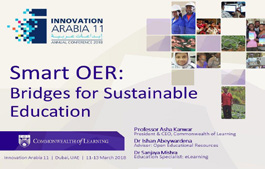 Creative uses of technology will lead to the development of smart open educational resources (OER), which will contribute to achieving sustainable education for all, Professor Asha Kanwar said in March 2018 at Innovation Arabia 11, in Dubai, United Arab Emirates. In her address titled “Smart OER: Bridges for Sustainable Education,” she stressed the need for policy development in OER to move beyond commitment to concrete action for achieving education for all.
Creative uses of technology will lead to the development of smart open educational resources (OER), which will contribute to achieving sustainable education for all, Professor Asha Kanwar said in March 2018 at Innovation Arabia 11, in Dubai, United Arab Emirates. In her address titled “Smart OER: Bridges for Sustainable Education,” she stressed the need for policy development in OER to move beyond commitment to concrete action for achieving education for all.
AFRICA
Blended learning in Uganda
COL is supporting the implementation of blended learning at the Uganda Management Institute (UMI). A capacity building workshop titled “Blended Learning Design Using Moodle” was conducted in March 2018 as a follow up to the visioning workshop held in November 2017. The workshop was aimed at improving educators’ capacity to design blended learning courses using Moodle and helping them explore the diferent functionalities and tools of the Moodle learning management system.
The workshop was inaugurated by UMI s acting Director General, Dr Kasozi S. Mulindwa. He thanked the 20 participants from the institute for their commitment and zeal in advancing technology in teaching and learning. Regarding the workshop s outcomes, one participant said: “I learnt that technology is an enabler to
teaching and learning. The purpose of the teaching and learning should be made known to learners, and technology comes in handy to achieve that goal.
The Gambia welcomed as member of COL
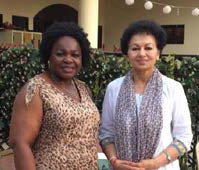 During her visit to The Gambia in June 2018, Professor Asha Kanwar met the country’s Minister of Basic and Secondary Education, the Honourable Claudiana Cole. Delivering a lecture at the University of The Gambia, titled “Developing an ODL Policy: An International Perspective,” Professor Kanwar stressed that ODL is a proven pathway to ameliorate barriers to access.
During her visit to The Gambia in June 2018, Professor Asha Kanwar met the country’s Minister of Basic and Secondary Education, the Honourable Claudiana Cole. Delivering a lecture at the University of The Gambia, titled “Developing an ODL Policy: An International Perspective,” Professor Kanwar stressed that ODL is a proven pathway to ameliorate barriers to access.
The Gambia rejoined the Commonwealth in February 2018.
Learning design workshop for teacher educators
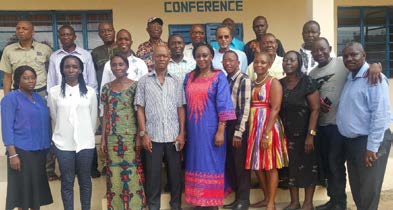
COL recently supported a series of learning design workshops in Kiribati, Nigeria and Sierra Leone between March and May 2018. The workshops in Nigeria and Sierra Leone combined face-to-face activities with online training events on COL’s Teacher Futures Moodle site. The workshop in Kiribati was offered to participants online.
COL’s Adviser: Teacher Education, Dr Betty Ogange, reported: “The workshops supported teacher educators in partner institutions to design and develop pedagogically sound educational content for print, eLearning and microlearning delivery, using modern trends in online educational theory and technology.”
During these workshops, participants from Freetown Teachers College (FTC), Sierra Leone, Kiribati Teachers College, and the National Teachers’ Institute, Nigeria, used a variety of multimedia technology tools to develop resources for their respective teacher development programmes.
Stakeholder forum in The Gambia
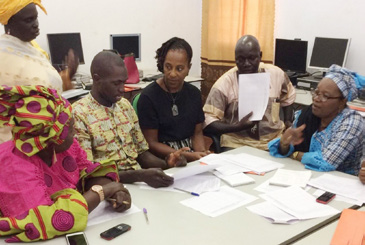 The Gambia College, in collaboration with the INSET Unit at the Ministry of Basic and Secondary Education (MoBSE), organised a four-day stakeholder forum for school-based teacher development in May 2018. The forum was aimed at fostering stakeholder participation in strategic development, leading to further collaboration between COL, the college, MoBSE, selected secondary schools and other key institutions.
The Gambia College, in collaboration with the INSET Unit at the Ministry of Basic and Secondary Education (MoBSE), organised a four-day stakeholder forum for school-based teacher development in May 2018. The forum was aimed at fostering stakeholder participation in strategic development, leading to further collaboration between COL, the college, MoBSE, selected secondary schools and other key institutions.
“The forum was the first in a series of such meetings to be held in various partner countries under COL’s Teacher Futures programme,” said COL’s Adviser: Teacher Education, Dr Betty Ogange. Participants were drawn from MoBSE and the Ministry of Higher Education, Research, Science and Technology, as well as the regional education office. Members of the Education Select Committee of the National Assembly also participated, along with members of The Gambia College Council, heads of secondary schools and lecturers from The Gambia College.
Uganda parliamentarians briefed on L3F model
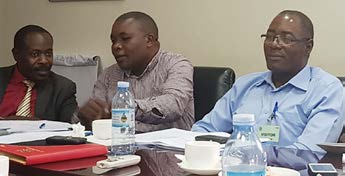 Makerere University, Kampala (MUK) recently briefed parliamentarians in Uganda on COL’s Lifelong Learning for Farmer’s (L3F) model. This dialogue with parliamentarians was organised to address the role and harmonisation of legislative initiatives and policies in enhancing food and nutrition security.
Makerere University, Kampala (MUK) recently briefed parliamentarians in Uganda on COL’s Lifelong Learning for Farmer’s (L3F) model. This dialogue with parliamentarians was organised to address the role and harmonisation of legislative initiatives and policies in enhancing food and nutrition security.
The meeting was part of the Food and Agriculture Organization’s (FAO) support for the Pan-African Parliamentary Alliance for Food and Nutrition Security, which is aimed at strengthening the capacities of parliamentarÂians in Africa to better legislate on food and nutrition security. The FAO has partnered with the Regional Universities Forum for Capacity Building in Agriculture (RUFORUM) – a network with 85 member universities in 35 African countries, of which MUK is a member – to implement community engagement activities through competitive grants to young graduates.
The members of parliament were interested in understanding how the L3F model would address the challenges of low and declining agricultural productivity, poor extension services, access to value-added technologies and interventions for smallholder farmers in Uganda.
Green Teacher programme in Nigeria
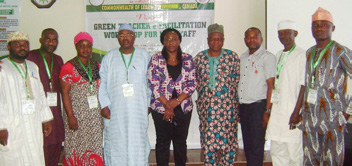 COL conducted an eLearning workshop for the Green Teacher programme at the National Teachers’ Institute (NTI), Kaduna, Nigeria, in March 2018. This workshop provided participants with an orientation to eLearning, online facilitation and collaborative problem-based learning.
COL conducted an eLearning workshop for the Green Teacher programme at the National Teachers’ Institute (NTI), Kaduna, Nigeria, in March 2018. This workshop provided participants with an orientation to eLearning, online facilitation and collaborative problem-based learning.
COL is working with the Federal Ministry of Education in Nigeria to support NTI in developing and implementing this environmental education programme to address the rapidly growing need for professional development in environmental sustainability. The programme will also enable teachers to inculcate in school children a knowledge of and interest in environmental issues from an early age.
Study tour to NAMCOL
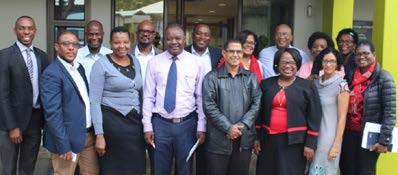 COL organised a study tour for Zambian and Mozambican teacher educators and education practitioners in April 2018. The tour to the Namibian College of Open Learning (NAMCOL) was aimed at exposing participants to the development and implementation of open educational resources (OER) at the college to improve the quality of OER being developed in their countries.
COL organised a study tour for Zambian and Mozambican teacher educators and education practitioners in April 2018. The tour to the Namibian College of Open Learning (NAMCOL) was aimed at exposing participants to the development and implementation of open educational resources (OER) at the college to improve the quality of OER being developed in their countries.
The tour accorded participants an opportunity to understand how NAMCOL had evolved in its use of ICT and in the implementation of the Notesmaster and Moodle platforms in colleges and schools. Several ICT programmes have been successfully deployed in Namibian schools.
Quality assurance workshop in Kenya
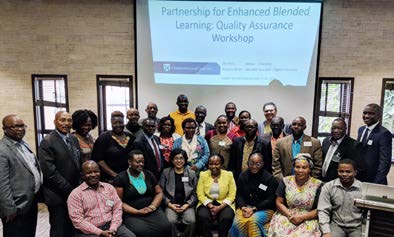 A four-day workshop on quality assurance was conducted in Nairobi under the aegis of the Partnership for Enhanced and Blended Learning (PEBL) project in April 2018. The PEBL project is being led by the Association of Commonwealth Universities and has three partners: COL, the Staff and Educational Development Association, UK, and the University of Edinburgh. The project is funded by the United Kingdom’s Department for International Development (DFID).
A four-day workshop on quality assurance was conducted in Nairobi under the aegis of the Partnership for Enhanced and Blended Learning (PEBL) project in April 2018. The PEBL project is being led by the Association of Commonwealth Universities and has three partners: COL, the Staff and Educational Development Association, UK, and the University of Edinburgh. The project is funded by the United Kingdom’s Department for International Development (DFID).
The workshop was aimed at building the capacity of 29 senior administrators and faculty from 21 universities in Kenya, Rwanda, Tanzania and Uganda. “The PEBL project serves to augment the quality of learning through a course-sharing initiative,” said COL’s Adviser: Education, Dr Kirk Perris. “Among the 21 participating institutions, six have been selected to design courses to be delivered through a blended-learning modality, with the product being the formation of a network where courses and credits can be shared among participating institutions.”
TEL workshop in Nigeria
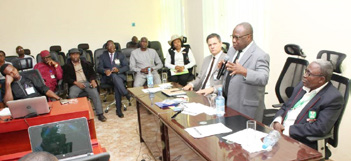 COL, in collaboration with the Regional Training and Research Institute for Open and Distance Learning, held a two-day workshop on technology-enabled learning at the National Open University of Nigeria (NOUN) in April 2018. The workshop, attended by 23 senior administrators and faculty from nine conventional Nigerian universities and the National Universities Commission, was aimed at supporting these universities in becoming dual-mode institutions.
COL, in collaboration with the Regional Training and Research Institute for Open and Distance Learning, held a two-day workshop on technology-enabled learning at the National Open University of Nigeria (NOUN) in April 2018. The workshop, attended by 23 senior administrators and faculty from nine conventional Nigerian universities and the National Universities Commission, was aimed at supporting these universities in becoming dual-mode institutions.
NOUN Vice Chancellor, Professor Abdalla Uba Adamu, stated that the open and distance learning system has expanded access to education by reaching more learners in Nigeria. He welcomed the expansion of conventional universities to dual-mode institutions.
Sierra Leone teachers sensitised on INSET project
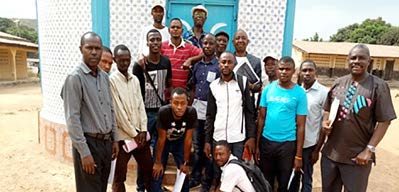 About 30 school principals and teachers took part in a three-day sensitisation workshop conducted by the Freetown Teachers College (FTC), Sierra Leone, in February 2018. The workshop was aimed at sensitising stakeholders about INSET, the integrated in-service teacher training project for junior secondary school teachers, and enhancing support for the project.
About 30 school principals and teachers took part in a three-day sensitisation workshop conducted by the Freetown Teachers College (FTC), Sierra Leone, in February 2018. The workshop was aimed at sensitising stakeholders about INSET, the integrated in-service teacher training project for junior secondary school teachers, and enhancing support for the project.
The INSET project is a collaboration between COL, FTC and Sierra Leone’s Ministry of Education, Science and Technology, to address declining learner performance and the demand for improved teacher quality in the country’s junior secondary schools. COL has provided technical assistance to FTC to design, develop
and implement a technology-supported, school-based teacher development programme for teacher educators to update their knowledge of subject content and pedagogy, as well as improve their capacity to deploy eLearning methodologies in teaching, learning and community engagement.
L3F model launched in Zambia
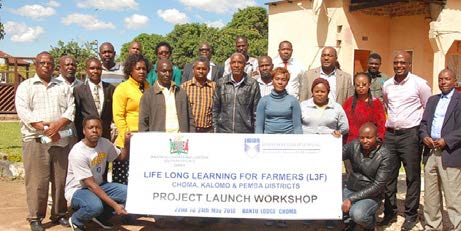 COL launched the Lifelong Learning for Farmers (L3F) model in Zambia in May 2018. This launch preceded a three-day capacity-building workshop, which was conducted for 25 extension officers from Zambia’s Ministry of Fisheries and Livestock. The workshop was aimed at equipping these officers with the requisite skills for using open and distance learning (ODL) technologies in farmer extension through the L3F model.
COL launched the Lifelong Learning for Farmers (L3F) model in Zambia in May 2018. This launch preceded a three-day capacity-building workshop, which was conducted for 25 extension officers from Zambia’s Ministry of Fisheries and Livestock. The workshop was aimed at equipping these officers with the requisite skills for using open and distance learning (ODL) technologies in farmer extension through the L3F model.
“This capacity-building exercise helps the officers in making extension a process that empowers farming communities to manage their own development, through self-directed learning and linkages with other stakeholders in the agricultural value chain. ODL is an effective tool to facilitate this process,” said COL’s Education Specialist: Agriculture and Livelihoods, Mr James Onyango.
ASIA
Mann Deshi Foundation President visits COL
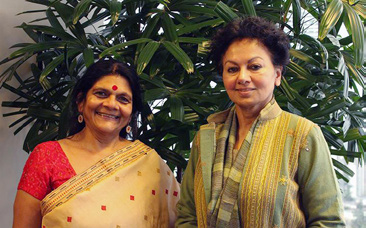 The Founder and President of the Mann Deshi Foundation, Ms Chetna Sinha, visited COL’s headquarters in April 2018 to share insights on the Lifelong Learning for Farmers (L3F) initiative and the GIRLS Inspire project. Mann Deshi is partnering with COL in implementing these two activities in India.
The Founder and President of the Mann Deshi Foundation, Ms Chetna Sinha, visited COL’s headquarters in April 2018 to share insights on the Lifelong Learning for Farmers (L3F) initiative and the GIRLS Inspire project. Mann Deshi is partnering with COL in implementing these two activities in India.
“COL is always thinking of people on the streets and those in need . . . finding ways to empower them. GIRLS Inspire is providing girls and women with knowledge and joy in very inspiring ways,” said Ms Sinha. She was provided with an update on a new board game aimed at educating women and girls in India on legal and social rights. This game is being developed by COL and the foundation, with the help of interns from the University of British Columbia, Canada.
COL’s Senior Adviser: Women and Girls, Ms Frances Ferreira, said, “We have developed an educational game to make learning about social and legal rights more engaging for girls whose rights have been taken away. This game will help to diversify their learning methods using a strong storytelling approach, and ensure that complex but important legal information is in the hands of those who need it.”
Gender mainstreaming in Sri Lanka
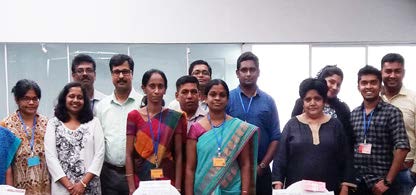 In collaboration with Sri Lanka’s University Grant Commission (UGC), COL conducted a three-day train-the-trainer workshop on “Gender Mainstreaming in Higher Education,” in Colombo in June 2018. The workshop was aimed at supporting Sri Lankan universities to develop an effective draft action plan to strengthen gender mainstreaming in their institutions.
In collaboration with Sri Lanka’s University Grant Commission (UGC), COL conducted a three-day train-the-trainer workshop on “Gender Mainstreaming in Higher Education,” in Colombo in June 2018. The workshop was aimed at supporting Sri Lankan universities to develop an effective draft action plan to strengthen gender mainstreaming in their institutions.
The workshop helped participants to understand important gender concepts and relate these to higher education in the country. Topics discussed included gender analysis frameworks to assess gender issues in higher education, international tools and good practices to mainstream gender, and adapting gender mainstreaming to the Sri Lankan context.
UGC’s Director: Center for Gender Equality and Equity, Professor Uma Coomaraswamy, welcomed 26 participants from seven universities and expressed appreciation to COL for supporting gender mainstreaming in the country’s higher education institutions.
TEL implementation
at Rajiv Gandhi University of Knowledge Technologies (RGUKT)
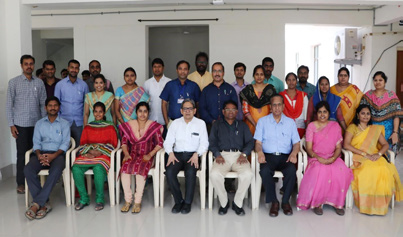 COL facilitated a workshop in March 2018 to review technology-enabled learning (TEL) implementation at Rajiv Gandhi University of Knowledge Technologies (RGUKT), India. Following the TEL policy developed last year, teachers at RGUKT have been engaged in offering 17 blended courses to over 2,000 students in different disciplines.
COL facilitated a workshop in March 2018 to review technology-enabled learning (TEL) implementation at Rajiv Gandhi University of Knowledge Technologies (RGUKT), India. Following the TEL policy developed last year, teachers at RGUKT have been engaged in offering 17 blended courses to over 2,000 students in different disciplines.
This is a result of COL’s continuous support of RGUKT faculty through a series of capacity-building workshops and mentoring using the Moodle learning management system as well as messaging via mobile phones and WhatsApp.
COL’s Education Specialist: eLearning, Dr Sanjaya Mishra, said, “The blended learning designs and the range of strategies adopted by the teachers to offer the courses are amazing, considering this is their first attempt at offering blended learning in a systematic manner. Courses are filled with teacher-created resources, links to open educational resources, interactive videos and quizzes.”
at Universiti Malaysia Sabah
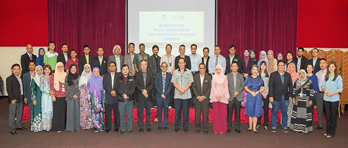 With COL’s support, a visioning workshop on developing policy for the systematic implementation of technology-enabled learning (TEL) was organised at Universiti Malaysia Sabah (UMS), Kota Kinabalu, in March 2018. This marked the beginning of a collaborative project between COL and UMS to integrate the use of blended learning in all UMS courses.
With COL’s support, a visioning workshop on developing policy for the systematic implementation of technology-enabled learning (TEL) was organised at Universiti Malaysia Sabah (UMS), Kota Kinabalu, in March 2018. This marked the beginning of a collaborative project between COL and UMS to integrate the use of blended learning in all UMS courses.
Inaugurating the workshop, UMS Vice Chancellor, Professor Datuk Dr D. Kamarudin D. Mudin, said that “to become a smart university, the UMS TEL policy will be in line with the DEPAN 2.0 [Malaysia’s National eLearning Policy 2.0] of the Ministry of Higher Education. . . It will help the students of UMS to constantly redefine their skills to meet the challenges of an increasingly competitive future.”
The workshop was facilitated by COL’s Education Specialist: eLearning, Dr Sanjaya Mishra, and attended by senior officials, deans and faculty of UMS. “With the upgrading of the eLearning unit to a centre,” said Dr Mishra, “UMS has shown increased commitment to support the adoption of TEL, and COL will help UMS in implementing the policy through capacity-building, blended course development, monitoring and evaluation.”
CARIBBEAN & AMERICAS
First cohort completes CVQ Assessor training in the Caribbean
The first cohort of 26 learners recently completed the first offering of the COL-supported online Caribbean Vocational Qualification (CVQ) Assessor course. Aimed at preparing learners to become certified assessors, the course was offered by the National Training Agency in Trinidad and Tobago and attracted participants from Barbados, Grenada and the host country. One of the learners is visually impaired. She currently serves as an information technology instructor at the National Centre for Persons with Disabilities, in San Fern


